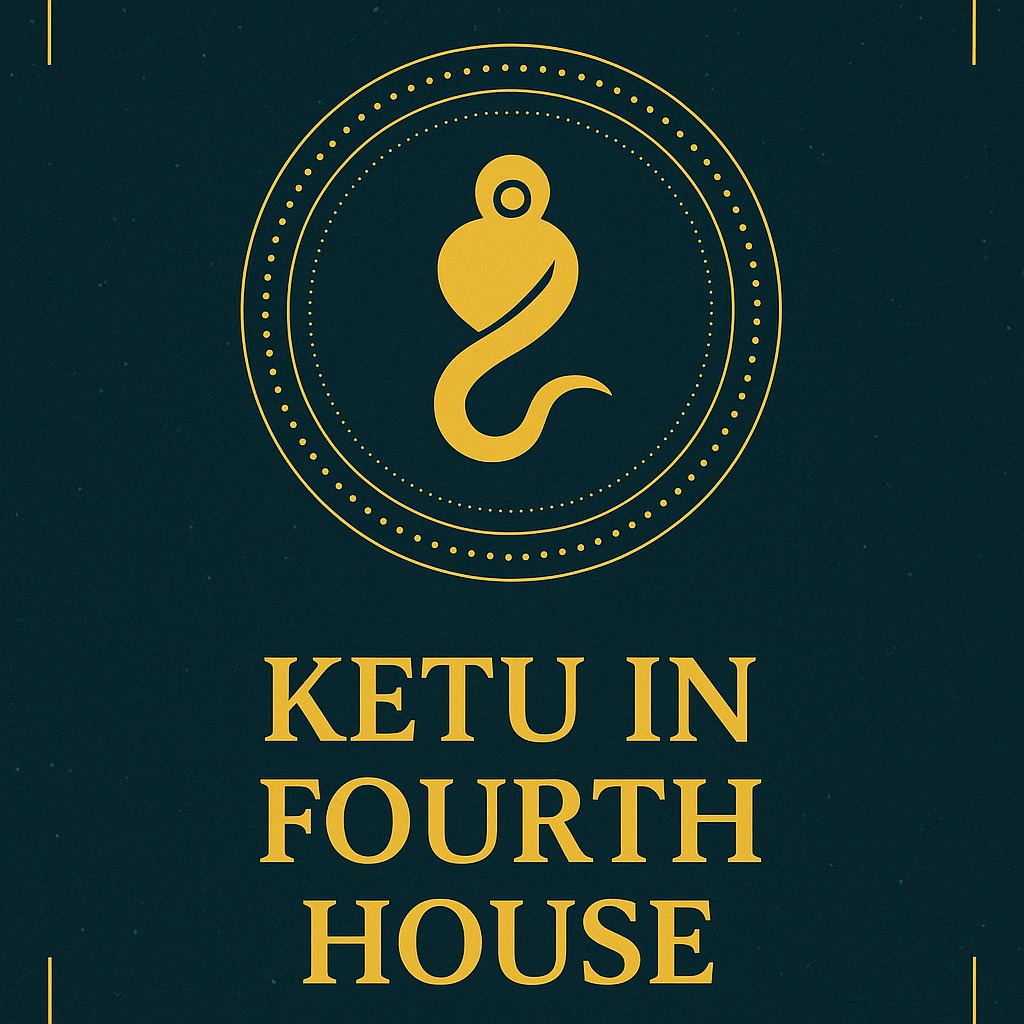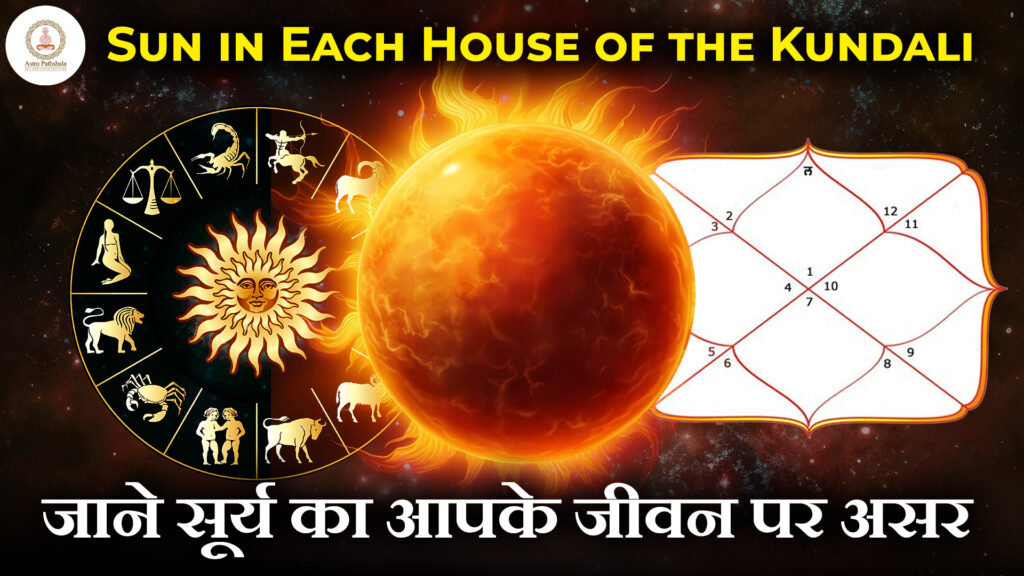In the vast universe of Vedic astrology, Ketu 4th house remains one of the most mysterious and misunderstood celestial entities. Known as the South Node of the Moon, Ketu does not have a physical form but carries immense karmic significance.
When positioned in the Fourth House of the birth chart, it brings forth a combination of spiritual lessons, emotional detachment, and deep-rooted karmic influences related to home, mother, inner peace, and emotional security.
Let’s delve into the lesser-known facts, positive and negative effects, and powerful remedies for Ketu in the 4th house.

Understanding The Fourth House in Vedic Astrology
The Fourth House, also known as Sukh Bhava or the House of Happiness, is one of the most emotionally significant houses in a Vedic birth chart. It forms the foundation of an individual’s inner security, emotional comfort, family roots, and real estate. Being the lowest point in the chart (the nadir), it represents what lies deep within you, your soul’s emotional base, and subconscious patterns inherited from your lineage.
Let’s break down the key areas governed by this house:
1. Emotional Security and Inner Peace
The Fourth House is the seat of your emotional landscape. The house represents an individual’s state of mind, such as how safe, nurtured, and secure you feels inside. It represents:
- The ability to feel settled, rooted, and emotionally content
- The depth of your private emotional world, away from public life
- How you respond to comfort, stress, solitude, or emotional intimacy
A strong and well-placed 4th house can indicate a person who is emotionally balanced, feels secure in themselves, and knows how to create peace in their inner world. Conversely, if afflicted, it can cause emotional instability, anxiety, and inner restlessness with a constant search for something that feels like “home” but remains elusive.
2. Mother and Maternal Influence
In Vedic astrology, the mother is the primary karaka (significator) of the 4th house. It represents:
- The relationship with your mother
- The kind of nurturing, support, and emotional environment you received during childhood
- The mother’s presence, temperament, or emotional health
A benefic planet here (like Moon or Jupiter) often indicates a loving, supportive, and spiritually enriching bond with the mother. A malefic (like Ketu, Rahu, or Saturn) can point to emotional distance, early loss, karmic complexities, or the need to detach from maternal influences emotionally.
3. Home, Shelter, and Living Environment
This house governs your physical home and real estate, including:
- The kind of house you live in (apartment, ancestral home, rented vs. owned)
- The energy and harmony of your domestic life
- Your comfort with permanence and shelter
It also reflects your attitude toward ownership, land, or creating a “nest”. For example, people with a strong 4th house often find joy in homemaking, interior design, or buying property. Those with afflicted placements may feel restless, frequently relocate, or live far from family or homeland.
4. Vehicles and Conveyances
Interestingly, the 4th house also represents vehicles and modes of transport. It symbolizes your mobility and convenience, including:
- Cars, bikes, or any mode of personal transport
- Your attitude toward comfort, luxury, and status through material objects
- Whether you’ll face smooth or troubled journeys, both literal and metaphorical
When afflicted, this house may indicate problems with vehicles, accidents, or an inability to enjoy the comforts of modern life.
5. Ancestral Roots, Traditions, and Homeland
The 4th house also holds information about:
- Your connection to homeland and culture
- The inheritance of values and traditions from your family or ancestors
- Whether you feel rooted to your past or detached from it
For people who immigrate, feel homesick, or experience exile, this house often plays a vital role. Karmic influences here may show someone who has past-life attachments or debts related to their homeland or family lineage.
6. Mental Stability and Psychological Well-being
Since the 4th house deals with the “heart-space,” it also reflects mental health, emotional intelligence, and psychological grounding. It indicates:
- Your reaction to emotional pain or stress
- How you process grief, trauma, comfort, or peace
- Your need for emotional safety and connection
A disturbed 4th house often corresponds to childhood trauma, deep-seated fears, insecurity, or depression, especially if the Moon (karaka of mind) is weak or afflicted here.
7. Spiritual Solitude and Inner Fulfillment
At its highest vibration, the 4th house teaches us about inner fulfillment that is not dependent on external sources. Especially in spiritual or ascetic charts, this house shows:
- The desire for a peaceful, sattvic environment conducive to meditation and inner work
- The soul’s urge to disconnect from material dependency and find comfort in divine connection
- The ability to live with less and feel internally full and content
This is particularly relevant when shadow planets like Ketu are involved, which seek moksha (liberation) through emotional detachment.
8. End of Life and Legacy
In Vedic astrology, the 4th house also provides clues about the later years of life, such as:
- Where you’ll settle down in old age
- The level of peace, comfort, and emotional satisfaction you’ll experience
- The state of your heart and mind as you grow older
It tells whether you’ll retire peacefully in a nurturing environment or face emotional loneliness, instability, or detachment in your twilight years.
Lesser-Known Facts about Ketu in the Fourth House
1. Past-Life Karmic Connection with Home and Mother
Ketu represents past-life karmas, and the fourth house governs the mother, family traditions, and homeland. When Ketu occupies this house, it often signifies unfinished karmic debts or attachments related to your maternal lineage, ancestral home, or emotional upbringing. You may feel disconnected from your place of birth or feel like an outsider in your own family.
At a deeper level, this placement may indicate that you already experienced emotional comfort or luxurious homes in a past life. And now in this birth, your soul is ready to detach from such comforts to seek higher spiritual truths.
2. Desire for Solitude in Familiar Surroundings
Ketu tends to withdraw wherever it is placed, and in the fourth house, this withdrawal manifests as a desire for solitude at home. Even if the native lives in a house filled with people, they may prefer staying in their own room, meditating, journaling, or engaging in spiritual practices.
These individuals are not very fond of social gatherings at home and may avoid emotional entanglements with family members. This doesn’t mean they dislike their family; it simply reflects their innate need for inner peace and space.
3. Subtle Psychic or Spiritual Imprints
Because Ketu rules the subconscious, psychic abilities, and mystical insight, its presence in the 4th house can open up the intuitive and psychic faculties of the native. They may experience deja vu, prophetic dreams, or flashes of insight, especially when alone or in a quiet domestic environment.
The home becomes more than just a residence; it becomes a place of spiritual downloads, introspection, and healing. This placement often shows someone with latent talents in astrology, occult sciences, energy healing, or psychology, even if they don’t pursue these paths professionally.
4. Detached or Absent Maternal Bond
One of the hallmark features of Ketu in the fourth house is a strained or emotionally distant relationship with the mother. The mother may be loving, but the native may still feel a strange sense of separation, abandonment, or disconnection.
In some cases, the mother could be overly spiritual, sickly, emotionally unavailable, or even absent during early years. This karmic pattern teaches the native that emotional self-reliance is necessary and that spiritual “mothering” can come from within or through divine sources.
5. Instability in Real Estate or Permanent Shelter
The fourth house signifies land, property, and permanent shelter. Ketu’s presence here can cause sudden changes, loss, or confusion related to real estate. The native might face difficulties in acquiring property, face unexpected disputes regarding land, or lose interest in owning a home altogether.
Even if they own a house, they might never feel “settled” or might frequently move from place to place. There is often an unconscious desire to live like a monk, wandering or simplifying one’s domestic life.
Positive Effects of Ketu in the Fourth House
While Ketu is often associated with detachment and loss, it also grants unique blessings when understood and aligned with:
Spiritual Depth from Within
Such natives often develop a rich inner life, capable of profound spiritual understanding. They find peace in meditation, introspection, and spiritual practices.
Minimalist and Non-Materialistic Attitude
Ketu here frees the native from unnecessary material burdens, allowing them to live a minimalist and emotionally independent lifestyle.
Natural Healers and Counselors
With heightened intuition and detachment, they can excel in professions like counseling, healing, psychology, or spiritual teaching, especially from home.
Negative Effects of Ketu in the Fourth House
When afflicted or poorly aspected, Ketu may manifest the following challenges for an individual:
Emotional Insecurity
The native may feel an emotional void or restlessness, making it difficult to feel “at home” anywhere.
Troubled Childhood or Domestic Life
Childhood may be marked by instability, frequent moves, or lack of maternal nurturing, leaving emotional scars.
Health Issues Related to Chest or Lungs
The 4th house governs the chest; afflicted Ketu may trigger issues like asthma, breathing problems, or heart-related conditions driven by emotional unrest.
Real Estate Losses or Property Disputes
Unpredictable outcomes in matters related to home ownership, vehicles, or ancestral land can occur, often due to negligence, spiritual testing, or karmic debt.
Powerful Remedies for Ketu in the Fourth House
If Ketu’s influence becomes overwhelming or disruptive, these remedies can help balance the energy:
1. Chanting Ketu Mantra
Regular chanting of the Ketu Beej Mantra brings spiritual grounding:
ॐ स्रां स्रीं स्रौं सः केतवे नमः॥
Om Sraam Sreem Sraum Sah Ketave Namah
2. Feed Stray Dogs or Donate to Old Age Homes
Ketu is associated with stray dogs, the elderly, and ascetics. Feeding animals or helping aged people enhances the positive impact of Ketu.
3. Keep Your Home Energetically Clean
Burn dhoop (frankincense), camphor, or sage regularly to remove stagnant or negative energies from the home space.
4. Avoid Wearing Grey and Smoky Shades
Unless suggested by a competent astrologer, avoid excessive use of grey or smoky colors, which amplify Ketu’s isolating influence.
5. Establish a Peaceful Meditation Corner at Home
Since inner peace is central to this placement, having a quiet space for meditation, journaling, or spiritual practice within your home can neutralize emotional unrest.
6. Seek Spiritual Mentorship
Learning under a guru or spiritual guide can help channel Ketu’s energy into wisdom and liberation.
Notable Professions and Talents of Natives with Ketu in Fourth House
Depending on the sign and planetary aspects, such individuals may excel in:
- Vastu Shastra, Feng Shui, or interior energy balancing
- Psychology and emotional wellness coaching
- Spiritual teaching or meditation guidance
- Astrology, palmistry, or tarot
- Creative writing or mystic literature
Is Ketu in the Fourth House a Curse or a Sin?
The truth is, Ketu neither blesses nor curses blindly. It is the planet of liberation (moksha), encouraging the native to detach from illusions and seek inner truth.
Ketu in the 4th house is not meant to deprive you of happiness but to redefine what “home” truly means, from a physical space to a spiritual sanctuary within.
Conclusion
Ketu in the Fourth House can be a challenging placement, especially in the emotional and domestic sphere. Yet, for those who recognize its spiritual purpose, it becomes a path to profound awakening. With awareness, self-work, and the right remedies, Ketu can transform the home from a place of emptiness into a temple of peace and spiritual evolution.
Visit our Asto Pathshala’s official website (Click Here) to explore more about the Ketu presence in the first, second, and third houses in the chart.
We guide you through the steps to read your chart in our online classes. You can enroll with us at the given contact details to learn Astrology.
Read more …
Ketu’s Influence in all the houses
Ketu in 2nd House: Understanding Effects and Remedies in Vedic Astrology
Kark Rashi Guide: Understanding Career Options, Emotional Wellness, and Health Aspects


